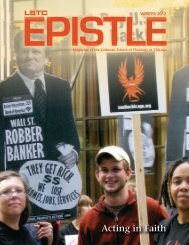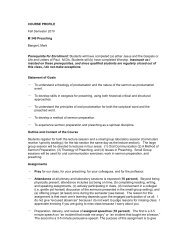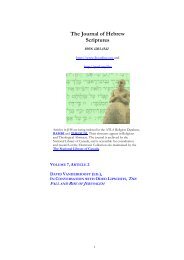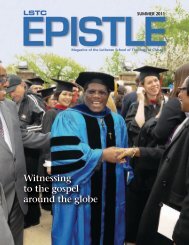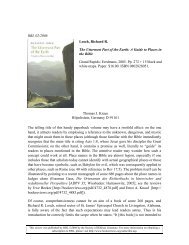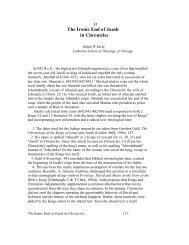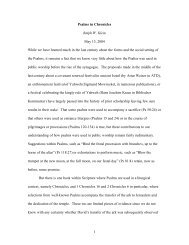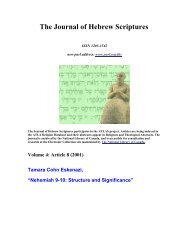Metacommentating Amos* Metacommentary, what is that ... - Fontes
Metacommentating Amos* Metacommentary, what is that ... - Fontes
Metacommentating Amos* Metacommentary, what is that ... - Fontes
You also want an ePaper? Increase the reach of your titles
YUMPU automatically turns print PDFs into web optimized ePapers that Google loves.
4. <strong>Metacommentating</strong> Amos 3<strong>Metacommentating</strong> Amos myself, I propose noticing some ofthe things commentators do. First, they adopt the view of thetext regarding the social and economic situation in ancient Israel.Secondly, they adopt the ideology of the text regarding the ex<strong>is</strong>tenceof God and the authenticity of the prophetic vocation.Thirdly, they conceal from their readers <strong>that</strong> th<strong>is</strong> <strong>is</strong> <strong>what</strong> they aredoing.1. Commentators and the Social Critique of AmosI take here the woe against the rich in Amos 6.4-7:Alas for those who lie on beds of ivory,and lounge on their couches,and eat lambs from the flock,and calves from the stall;who sing idle songs to the sound of the harp,and like David improv<strong>is</strong>e on instruments of music;who drink wine from bowls,and anoint themselves with the finest oils,but are not grieved over the ruin of Joseph!Therefore they shall now be the first to go into exile,and the revelry of the loungers shall pass away (NRSV).Let me engage first in a little Sachkritik as a backdrop to readingsome commentators. There <strong>is</strong> undoubtedly a great deal of angerin th<strong>is</strong> passage against the rich in Samaria, and its spirit ofdenunciation against idleness and luxury strikes a chord withdemocratically minded and hard-working readers. But a readerwho has not yet opened a commentary pauses, at least longenough to ask, What exactly <strong>is</strong> the crime of these Samarians forevaluation of their text. Here, for example, <strong>is</strong> Richard S. Cripps: ‘[T]heProphet’s conception of God <strong>is</strong> not perfect. One of the m<strong>is</strong>takes which theChr<strong>is</strong>tian Church has made, resulting in damage impossible to calculate,has been to standard<strong>is</strong>e as eternal and ultimate truth <strong>that</strong> which was but astage—however lofty—in the slow process of its revelation and d<strong>is</strong>covery . . .If any picture of God found within the O.T. had been perfect, then one ofthe reasons for the appearing of Jesus would have become unnecessary’ (ACritical and Exegetical Commentary on the Book of Amos [London: SPCK, 1929],p. 25). However unacceptable today the theory of ‘progressive revelation’may be, at least it enabled its adherents to adopt a critical stance towardtheir texts.



